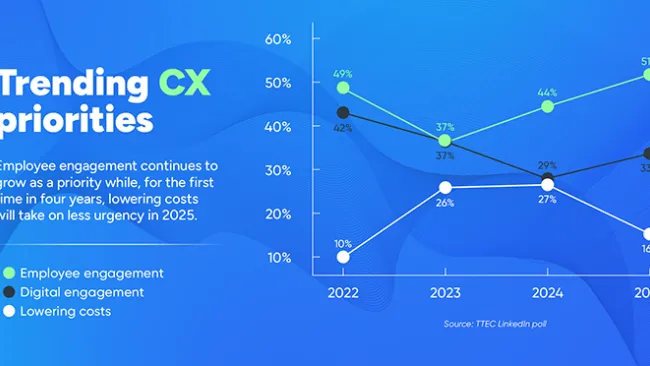Workers increasingly want to feel energized and valued at their jobs, and in today’s tight labor market companies that don’t prioritize employee engagement are losing talent to brands that do.
Young, growing companies have a lot on their plates when it comes to determining priorities but focusing on employee experience (EX) from the outset will pay off well over the long run.
There’s a lot of room for improvement in this area: research shows 50% of people feel their companies aren’t doing all they can to improve employee wellbeing and happiness at work, while 46% of U.S. workers say their expectations around happiness in the workplace have increased in the past year alone.
Contact center associates are particularly likely to be unhappy – 87% say they experience high levels of stress on the job, and their average turnover rate is above 40% – so the stakes for keeping them engaged are especially high.
Attrition is a costly problem for brands. It typically costs anywhere from half of an employee’s salary to twice that employee’s salary to replace a worker. That is a huge expense to take on, especially when your company is in its early days.
There are various ways to boost employees’ happiness, including giving them some autonomy over their own schedules with a flexible work model. And there are many benefits a growing company will reap when it prioritizes employee experience.
Engaged employees are better at their jobs
Workers who feel satisfied at their jobs are more likely than their counterparts to be truly invested in their work. They take pride in their work, which makes them better at providing seamless customer experience (CX) for several reasons.
Workers who feel engaged in their jobs often possess a higher level of product knowledge and expertise than others. They are more likely to stay updated on product or service information and this positions them well to provide proactive CX support, make recommendations during customer interactions, and even identify and capitalize on upsell opportunities.
Happy employees also tend to go the extra mile to deliver an exceptional customer experience. They are more likely to be patient, empathetic, and attentive during customer interactions and to provide a highly personalized experience.
An Oxford University study found that employees are 13% more productive when they’re happy. Having more productive associates means your company can service more customers, more quickly and easily. All these factors contribute to an improved customer experience with your brand.
Happy workers become brand ambassadors
When employees genuinely enjoy their work, their excitement shines through in how they talk to and help customers. Associates are the front line of any brand, and when they feel truly valued, appreciated, and happy at their jobs, they evolve into true ambassadors for your company.
Word-of-mouth from happy employees can be powerful, even beyond the realm of customer interactions. They will boost your brand’s reputation when they speak highly of their work environment to their families and communities, which can be especially beneficial as a growing number of consumers want to support businesses that treat their workers well.
And when customers have an interaction with a happy employee, it reflects positively on your brand – growing loyalty, improving CX, and ultimate bolstering sales and revenue.
What’s at stake when your associates are not happy on the job? Research shows 40% of consumers think unfriendly associates are among the most frustrating aspects of a bad customer experience, and 50% of consumers will leave a brand for a competitor after just one bad experience (80% will leave after more than one bad experience).
An experienced partner can help
With all the competing priorities at a growing company, it can be difficult to find the time and people to devote to improving employee experience. Working with an expert partner can help. With the tools, processes, and solutions you need to keep your workforce engaged, a partner will free you up to stay focused on your brand’s core mission.















